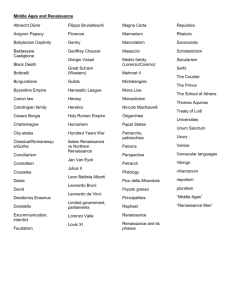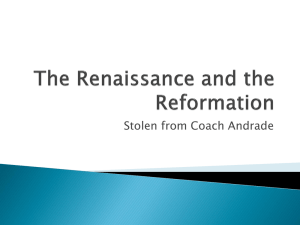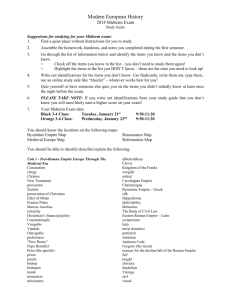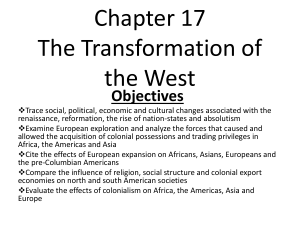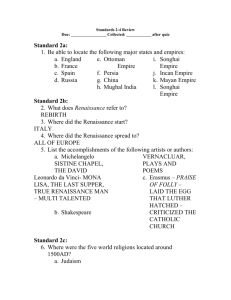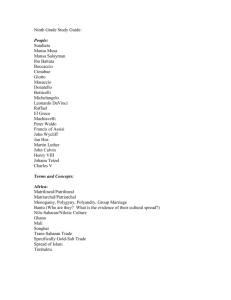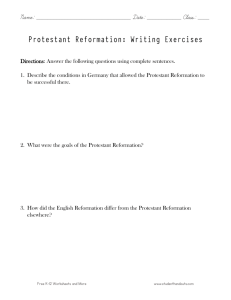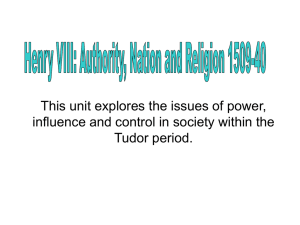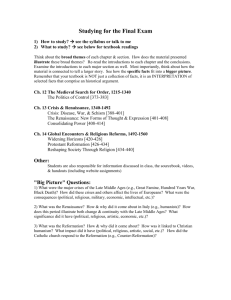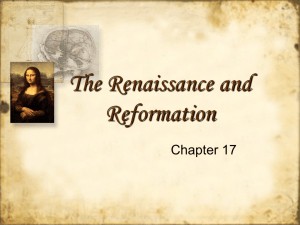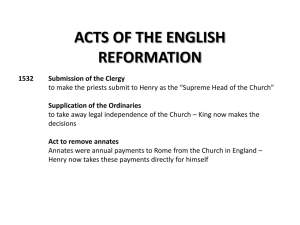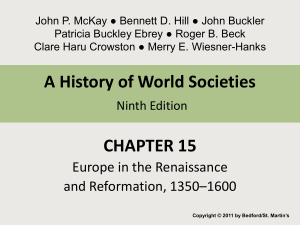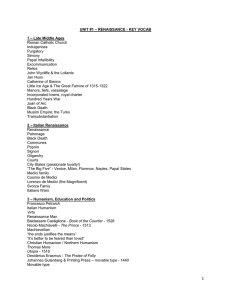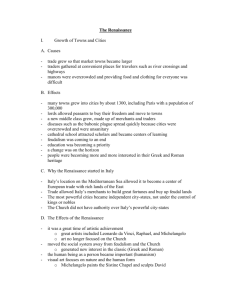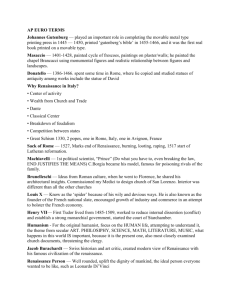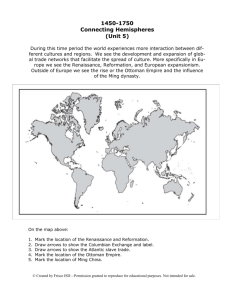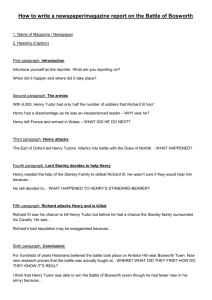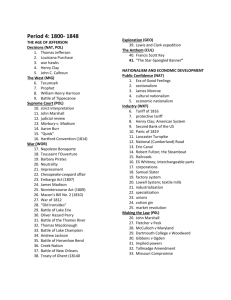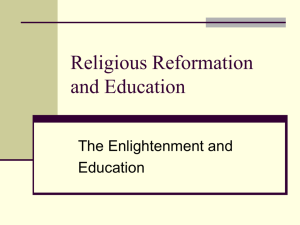AP European History
advertisement
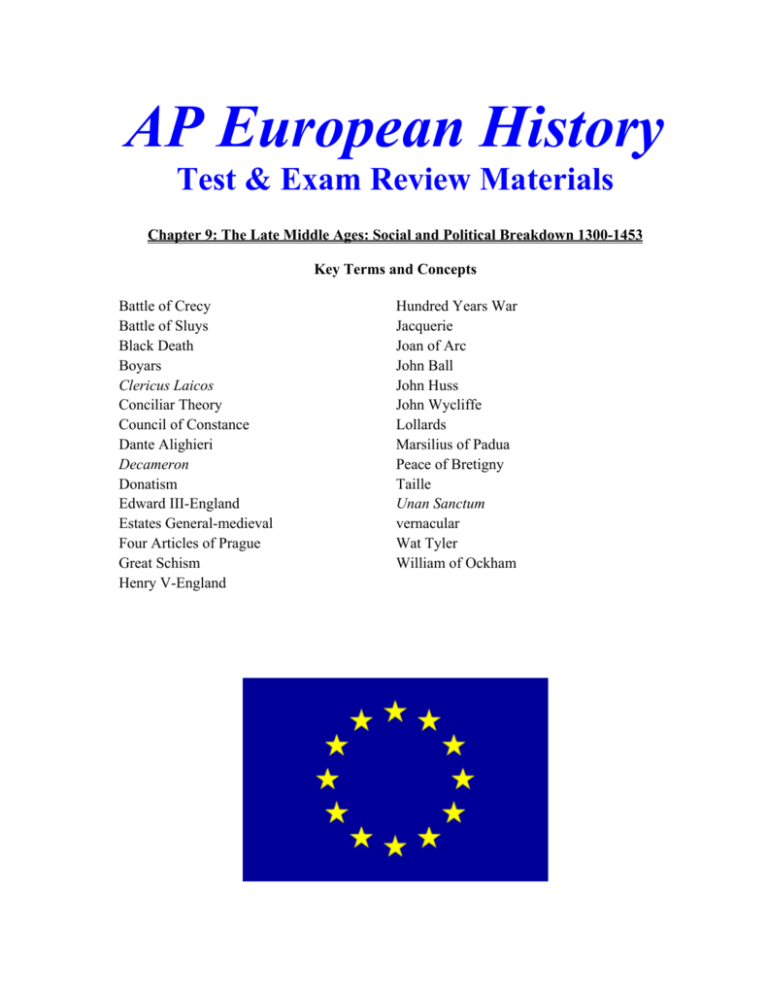
AP European History Test & Exam Review Materials Chapter 9: The Late Middle Ages: Social and Political Breakdown 1300-1453 Key Terms and Concepts Battle of Crecy Battle of Sluys Black Death Boyars Clericus Laicos Conciliar Theory Council of Constance Dante Alighieri Decameron Donatism Edward III-England Estates General-medieval Four Articles of Prague Great Schism Henry V-England Hundred Years War Jacquerie Joan of Arc John Ball John Huss John Wycliffe Lollards Marsilius of Padua Peace of Bretigny Taille Unan Sanctum vernacular Wat Tyler William of Ockham Chapter 10: Renaissance & Discovery Key Terms and Concepts Aragon & Castile Boccaccio Brittany Burgundy Cardinal Francisco Jimenez de Cisneros Cesare Borgia Charles VIII-France civic humanism condottieri Cosimo de' Medici Court of Star Chamber Desiderius Erasmus Ferdinand of Aragon gabelle Girolamo Savonarola Golden Bull Heiko Oberman Henry VII-England Holy Roman Empire humanism humanities Isabella of Castile Johan Huizinga Johannes Gutenberg League of Venice Leonardo da Vinci mannerism Manuel Chrysoloras Michelangelo Niccolo Machiavelli Northern Renaissance Petrarch Platonism Raphael Renaissance The Prince Thomas More Tudor Dynasty Utopia 2 Chapter 11: The Age of Reformation Key Terms and Concepts Act of Supremacy Anababtists Anne Bloeyn Augsburg Confession Charles V-Holy Roman Empire Council of Trent Counter-Reformation Diet of Worms English Reformation Henry VIII-England Ignatius of Loyola indulgences Jesuits John Calvin Martin Luther Miguel de Cervantes Saavedra Ninety-Five Theses Peasant Revolt Philip Melanchthon Philip of Hesse Reformation Reformation Parliament Schmalkaldic League Thomas Cranmer Ulrich Zwingli William Shakespeare 3 Chapter 12: The Age of Religious Wars Key Terms and Concepts Battle of Lepantro canton Catherine de Medici Catholic League consumbstantiation cuis regio, eius religio Mary I "Bloody Mary" Mary, Queen of Scots Philip II politiques predestination Protestant Union St. Bartholomew's Day Massacre theocracy transubstantiation Treaty of Westphalia Virgin Queen William of Orange Duke of Alba Edict of Nantes Francis Drake Henry IV of Navarre Huguenots John Knox 4 Chapter 13: European State Consolidations in the 17th & 18th Centuries Key Terms and Concepts "Contract theory" of government "Glorious Revolution" "Popery" "Rump" Parliament Act of Settlement (1701) Battle of Poltava Bill of Rights (1688-89) Boussuet boyars Cardinal Mazarin Cardinal Richelieu Cavaliers Clarendon Code Colbert Fronde Grand Remonstrance Hanoverians intendants Jansenists Junkers Triennial Act Ulster Plantation War of Devolution Whigs Long Parliament Mercantilism Navigation Act (1651) New Model Army Nobless d'Eppe Nobless d'Robe oligarchy Petition of Rights (1628) Pragmatic Sanctions Pugachev Rebellion Puritans Roundheads ship money strelsi Sully Test Act (1673) Toleration Act (1689) Tories Oliver Cromwell Charles II (Stuart) 5 Chapter 14: New Directions in Thought & Culture in the 16th & 17th Centuries Key Terms and Concepts Baruch Spinoza Blaise Pascal Cartesian dualism Copernicus deductive reasoning Deism Don Quixote emperical observation Epicycle Francis Bacon Galileo Galilei heliocentrism inductive reasoning Johannes Kepler John Bunyon John Locke John Milton Leviathan panentheism Paradise Lost Pilgrim's Progress Principia Mathematica Ptolemy Rene Descartes Robert Boyle The Pilgrim's Progress Thomas Hobbes Tycho Brahe William Harvey 6 Chapter 15: Society & Economy Under the Old Regime in the 18th Century Key Terms and Concepts Agricultural Revolution ancien regime aristocratic resurgence banalities bourgeoise corvee Edmund Cartwright enclosure family economy game laws ghettos hobereaux Industrial Revolution James Watt Jethro Tull Junker neolocalism Pugachev Robert Bakewell spinning jenny sumptuary laws taille Thomas Newcomen Turnip' Townsend waterframe 7 Chapter 17: The Age of Enlightenment: 18th Century Thought Key Terms and Concepts "Philosopher-King" "the first servant of the state" Adam Smith Baron de Montesquieu Calas affair Candide Catherine the Great constitutionalism. cosmology cosmopolitanism Deism Denis Diderot Encyclopedia Enlightened absolutism Francois Quesnay Frederick I (1714-1740) Prussia Frederick II (1740-1786) Prussia General Will Immanuel Kant Issac Newton Jean-Jacques Rousseau John Locke John Wesley Joseph II (1765-1790) Austria laissez-faire Maria Theresa (1740-1780) Austria Mary Wollstonecraft Methodism Montesquieu Peter the Great (1682-1725) Russia philosophes Physiocrats Pietism rationalism salons The Social Contract utilitarianism Voltaire Wealth of Nations 8
